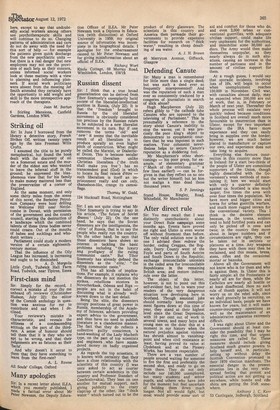Sir: I am not quite clear what Mr Tibor Szamuely
is trying to say in his article, 'The future of Soviet dissent' (July 221. On the one hand, he says that the Soviet dissenters are the intelligentsia, the ' elite' of Russia, that is to say the
people who really run the country. On the other hand, he says that these dissenters have shown no interest in tackling the basic problems including "the luxury and profligacy of the ruling communist caste." But Tibor Szamuely has already defined the dissenters as the 'elite,' "the ruling communist caste."
This has all kinds of implications. For example, it explains why the dissenters do not mention the strikes, rebellions etcetera in Novocherkask, Odessa and Riga — people are not in the habit of discussing what is already wellknown down to the last detail.
Being the elite, the dissenters occupy positions of great power in Russia, membership of the Academy of Sciences, advisers providing expert adVice to the government, and thus have no need to publish literature in a clandestine manner. The fact that they do reflects a collective guilty conscience, 'a hand-washing of the Lady Macbeth type, on the part of top scientists and engineers who have squandered money on badly organised projects.
As regards the top scientists, it is known with certainty that they have a close relationship with the scientists of this country (I was once asked to act as courier between certain academics in this country and Professor Standart of Czechoslovakia). They lean on one another for mutual support, each giving publicity to the crazy claptrap of the other, like "thick water" which turned out to be the product of dirty glassware. The scientists in this country and America then persuade their governments to provide expensive facilities for research on "thick water," resulting in cheap desalt
ing of sea water. A. J. H. Brown
46 Merryton Avenue, Giffnock, Glasgow


























 Previous page
Previous page